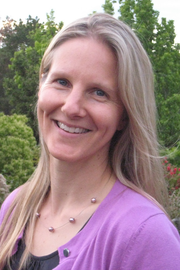
Current Research and Scholarly Interests
Ion transport across the hydrophobic barrier of the cell membrane is a primary challenge faced by all cells. Such transport sets up and exploits ion gradients, thus providing the basic energy and signaling events that are the foundation of life. The Maduke laboratory studies the molecular mechanisms of ion channels and transporters, the proteins that catalyze this transport. Its major research focus is on the chloride-selective CLC family, which contains both types ion-transport protein. CLC proteins are expressed ubiquitously and perform diverse physiological functions in cardiovascular, neuronal, muscular, and epithelial function. The Maduke lab uses a combination of biophysical methods to investigate membrane-protein structure and dynamics together with electrophysiological analyses to directly measure function.
A major direction includes developing NMR approaches for studying CLC structure and dynamics and combining these studies with molecular dynamics simulations (in collaboration with Emad Tajkhorshid, University of Illinois). As part of this endeavor, the Lab is part of the Membrane Protein Structural Dynamics Consortium, a multidisciplinary team focused on elucidating the relationship between structure, dynamics and function in a variety of membrane proteins - http://memprotein.org/.
The Maduke Lab is also developing novel small-molecule inhibitors as tools for studying the CLC proteins, in collaboration with Prof. Justin Du Bois (Chemistry). These molecules will be used as biophysical probes to advance its understanding of CLC mechanisms, as cellular probes to study CLC-mediated physiological processes, and as lead compounds for treating several types of CLC-related diseases. The latter effort is in collaboration with Prof. Alan Pao (Medicine) and funded by the Stanford SPARK program.
In a new multidisciplinary team effort, The Maduke Lab working in the emerging field of non-invasive ultrasonic neural modulation, with the goal of developing ultrasound technology for non-invasive brain stimulation in experimental and clinical applications. Research is in collaboration with Profs. Baccus (Neurobiology), Butts-Pauly (Radiology) and Khuri-Yakub (Electrical Engineering). The Lab is addressing the problem and the molecular level, studying the effects of ultrasound on ion channels in reduced systems using electrophysiological recording techniques.
Source: http://med.stanford.edu/profiles/cvi/faculty/Merritt_Maduke/